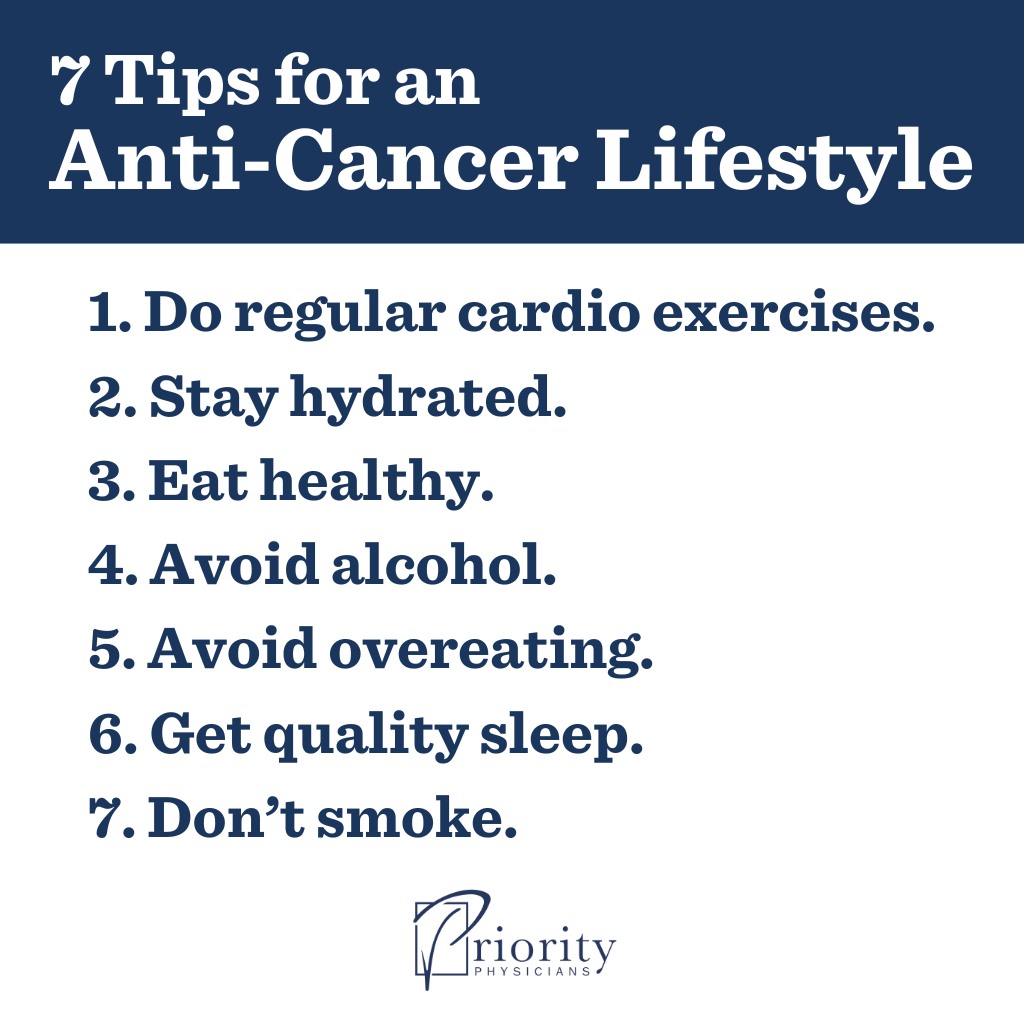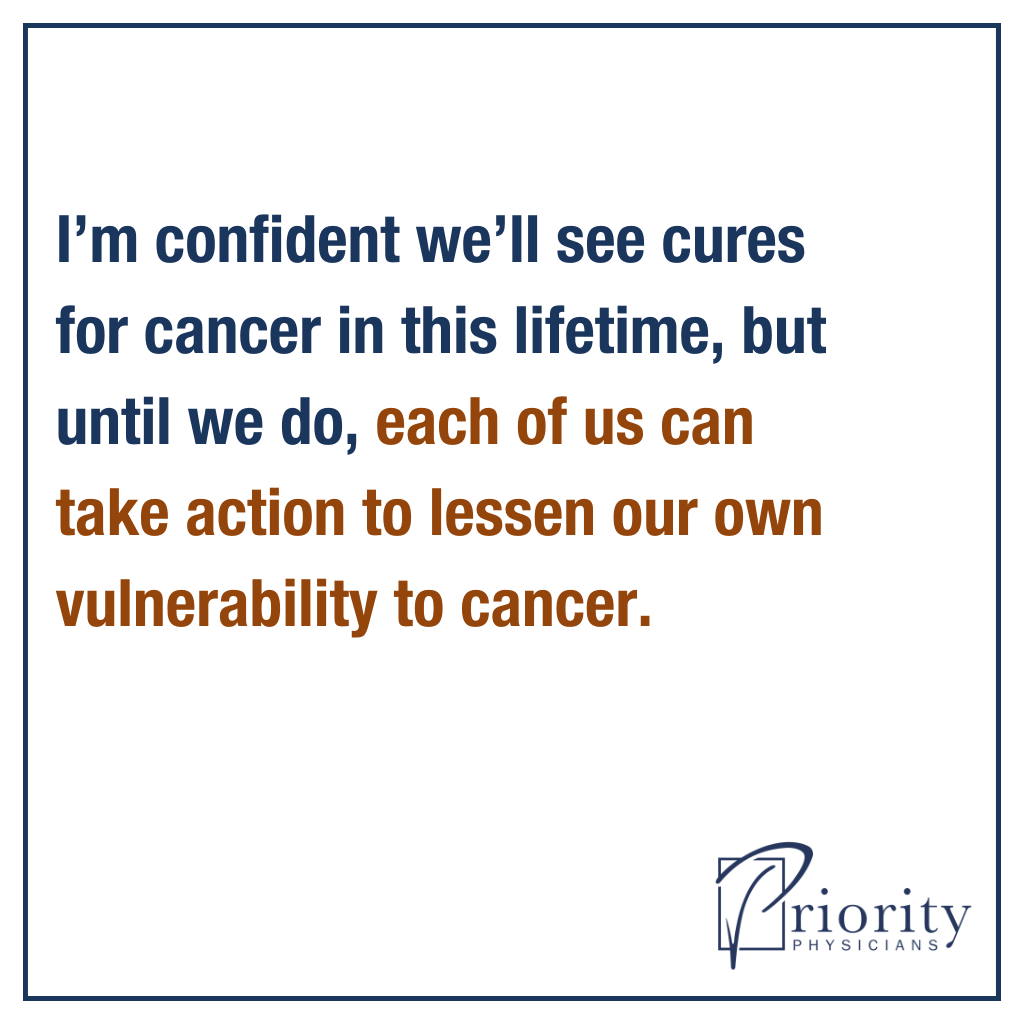Every year, we come closer to a cure for many forms of cancer. It’s also exciting and inspiring to see frequent advances in screening technologies and early cancer detection.
But what’s almost as inspiring as curing cancer is preventing it from occurring in the first place. One essential, effective way to help prevent cancer is by adopting lifestyle changes that control inflammation.
Of course, the role inflammation plays can be good or bad. Good inflammation helps fight off invading organisms, heal injuries, and clear cellular debris from our bodies.
But bad inflammation is destructive. When even low-grade inflammation becomes chronic, it threatens healthy cells. A constant inflammatory state is the perfect environment for cancer to thrive.

7 Tips for an Anti-Cancer Lifestyle
We’ve learned that specific lifestyle changes can go a long way toward lowering troublesome inflammation and keeping you on the track to good health.
Here are seven ways you can live an anti-cancer lifestyle that will fight cancer-causing inflammation:
1. Do regular cardio exercises.
Engage in 150 minutes of vigorous cardio per week (whatever “vigorous” means for you).
If done regularly, a brisk, low-impact workout can effectively rid the body of many inflammatory toxins.
2. Stay hydrated.
The simplest and most effective source of hydration is water. Water flushes out toxins and other irritants, preventing them from causing inflammation. Keep a water bottle around constantly, and drink to the point that you’re never thirsty.
3. Eat healthy.
Your mom was right: You need a diet rich in fruits and vegetables, which deliver the micronutrients your body thrives on.
Try to limit your intake of carbohydrates — the sugar molecules from carbs encourage inflammation. Although the current recommendation says that carbohydrates should make up a little over half of your daily calories, aiming for a much lower amount is ideal for most people.
4. Avoid alcohol.
Alcohol seems more prevalent now than in past decades — it’s even available at the grocery store. Yet, even as it’s all around us, medical science cautions us about alcohol’s link to inflammation and cancer.
Because alcohol is a known carcinogen, the federal government recently issued new guidelines that recommend limiting daily alcohol consumption to two drinks or less per day for men and one drink or less for women.
5. Avoid overeating.
Food is essential. Our bodies require all those essential macro and micronutrients. But how much is too much?
I’m not saying you should skip Thanksgiving dinner this year. But in general, consuming excess calories on a regular basis breeds systemic inflammation.
Making an active effort to cut back on unneeded calories helps break the inflammatory cycle. Even mice consistently live longer when they don’t overeat.
6. Get quality sleep.
Good sleep is one of the most restorative things we can give our bodies. Among sleep’s many critical advantages are regeneration of skin cells, repair of muscle damage, and strengthening of nerve cells in the brain.
Be sure you’re getting the recommended eight hours of high-quality sleep each night, allowing you to cycle through appropriate intervals of REM and deep sleep. After a night of adequate sleep — both in quantity and quality — you should awake feeling energized and refreshed.
7. Don’t smoke.
Inhaling smoke or fumes of any type is unsafe for the body. Cigarettes, marijuana, and vaping all cause irritation that triggers inflammation in the airways and other areas of the body.
If you’re a smoker or vaper, make a solid effort to quit. And if you don’t smoke, please don’t start.

An Anti-Cancer Lifestyle: Let’s Get You Started
I’m confident we’ll see cures for cancer in this lifetime, but until we do, each of us can take action to lessen our own vulnerability to cancer.
Concierge medicine and direct primary care are here to help. Consult with your Priority Physicians for advice, guidance, and support focused on your long-term goals and aspirations.
We’ll help you start living an anti-cancer lifestyle.

